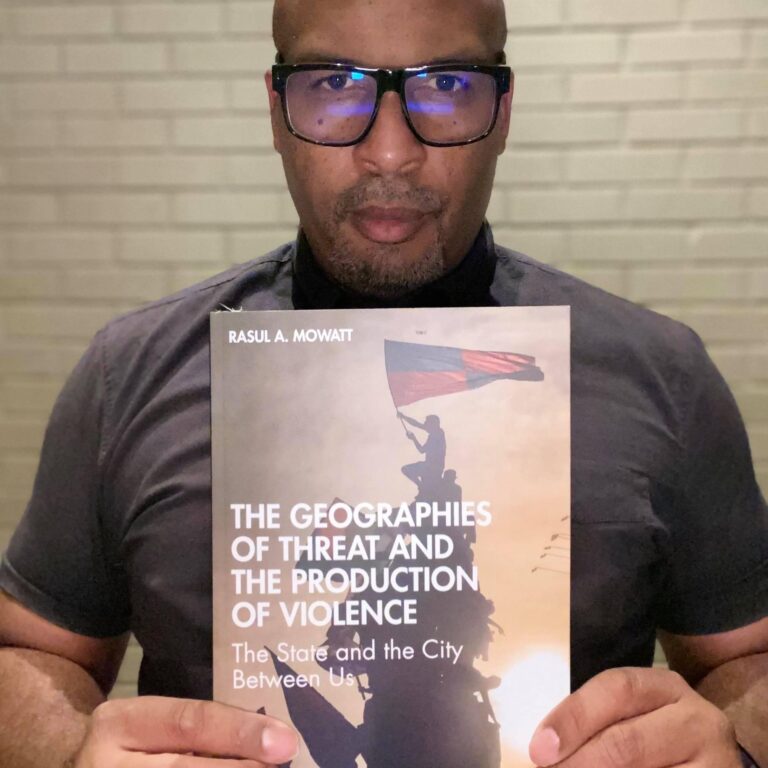Rasul Mowatt PhD

Department Head and Professor
Department of Parks, Recreation and Tourism Management
Biltmore Hall (Robertson Wing) 4008C
namowatt@ncsu.eduBio
Rasul A. Mowatt is the Department Head of Parks, Recreation, and Tourism Management in the College of Natural Resources and Affiliate Professor in the Department of Sociology and Anthropology at North Carolina State University. Formally served as a Professor in the Departments of American Studies and Geography in the College of Arts + Science at Indiana University. Rasul is a researcher whose primary areas of focus are: Geographies of Race, Geographies of Violence, Animation of Public Space, and Critical Leisure Studies. Published research articles and chapter have been on analyzing racially violent forms of leisure in the American Behavioral Scientist, Policy Futures in Education, the International Journal of the Image, and in the collaborative release of Globalizing Cultural Studies: Ethnographic Interventions in Theory, Method & Policy; criticisms of public participation in mega event planning such as the 2016 Olympic Bid for Chicago in Loisir et Société / Society and Leisure; the importance of utilizing service-learning to teaching diversity and social justice in the International Journal of Critical Pedagogy; the dangers in online and media viewing images of state sanctioned violence against racialized populations in Biography; the enduring legacy of Tamir Rice for city and park administration in Leisure Sciences; the liminality of identity and activism in protest events in Liminality and Critical Event Studies: Boundaries, Borders and Contestationthe intersections of historical racial violence and racial discrimination that informs Black travel in Current Issues in Tourism; the complexities of visitation to Ghanaian Slave Castles in Annals of Tourism Research; and most recently, re-examining the sites and travels of Dylann Roof in preparation for his killing of nine Black churchgoers in South Carolina in the collected volume Socialising Tourism, and rethinking the modus operandi of lynchers of Black women in the Palgrave Handbook of Critical Race and Gender. Most recently published the book, The Geographies of Threat and the Production of Violence: The City and State Between Us, with Routledge in 2021.
His interests and concerns are strongly centered on critiquing society for issues that are most prevalent in impacting quality of life. Professor Mowatt has presented his work in more than ten countries, and has published in various leisure and tourism-related publications, as well as in other fields. His prior work included serving as a City Commissioner for the Champaign Human Relations Commission; Program Director for the American Friends Service Committee; Field Coordinator for the National Association for the Advancement of Colored People; President for the Sunrise Rotary Club of Champaign-Urbana; and, Community Programs Manager for the Champaign Park District. It was this line of work that brought him to completing both his Master of Science degree in Park and Natural Resource Management at the University of Illinois at Urbana-Champaign, where he previously completed a Bachelor of Arts in History (North and East African, Early American History). He would continue at the University Illinois for a PhD. In Leisure Behavior directly following his M.S.. The combination of these studies informed his dissertation work on looking at the nature and relationship between leisure, natural/built environment, and Race via lynching history and photography.
In his spare time he has enjoyed DJing as an art form, spinning house, hip hop, reggae, and electronic music for more than 25 years. He whole-heartedly reflects, quite often, on a quote from Octavia Butler’s Parable of Sower, “All that you touch, you change. All you change, changes you….”
Area(s) of Expertise
American Studies: social justice (injustice and violence), the sociology of leisure (leisure theory/history/philosophy; public space; and, tourism), cultural studies (visual and media inquiry), and critical pedagogy (historical analysis; social critique; and, critical action)
Geography: geographies of Race (critical cultural geography; urban geography; Black geographies), geographies of violence and threat (landscapes and memorials of lynching and race riots; performance of White power), and the animation of public space (urban anthropology; political access, restriction, and use)
Publications
- A people's history of leisure studies: crimes against leisure in 8 images , WORLD LEISURE JOURNAL (2025)
- Parting Thoughts XXXV: Trauma, Healing, Health, and Leisure , LEISURE SCIENCES (2025)
- The Editorial , COGENT SOCIAL SCIENCES (2025)
- The future of leisure studies in six landscapes , LOISIR & SOCIETE-SOCIETY AND LEISURE (2025)
- They aren't all named Karen: digital dating in a racist (or white man's) world , WORLD LEISURE JOURNAL (2025)
- Parting Thoughts XXVI: Leisure, Loss, and Death , LEISURE SCIENCES (2024)
- Parting Thoughts XXVIII: Leisure and the Anthropocene , LEISURE SCIENCES (2024)
- Parting Thoughts XXXI: The Fraying of Society , LEISURE SCIENCES (2024)
- Routledge Handbook of Sport, Leisure, and Social Justice , (2024)
- Sport, leisure, and social justice at the neoliberal moment , (2024)